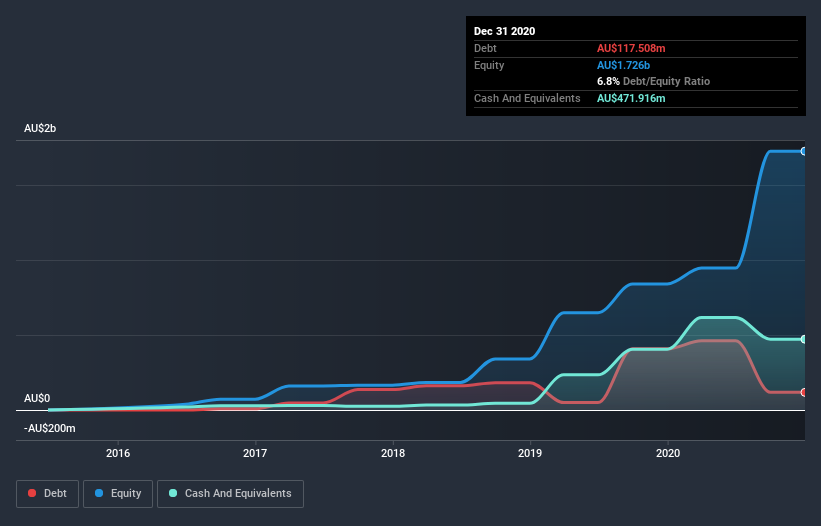Does Afterpay (ASX:APT) Have A Healthy Balance Sheet?
David Iben put it well when he said, 'Volatility is not a risk we care about. What we care about is avoiding the permanent loss of capital.' So it seems the smart money knows that debt - which is usually involved in bankruptcies - is a very important factor, when you assess how risky a company is. Importantly, Afterpay Limited (ASX:APT) does carry debt. But is this debt a concern to shareholders?
When Is Debt A Problem?
Debt is a tool to help businesses grow, but if a business is incapable of paying off its lenders, then it exists at their mercy. Ultimately, if the company can't fulfill its legal obligations to repay debt, shareholders could walk away with nothing. While that is not too common, we often do see indebted companies permanently diluting shareholders because lenders force them to raise capital at a distressed price. Of course, plenty of companies use debt to fund growth, without any negative consequences. The first thing to do when considering how much debt a business uses is to look at its cash and debt together.
Check out our latest analysis for Afterpay
How Much Debt Does Afterpay Carry?
As you can see below, Afterpay had AU$117.5m of debt at December 2020, down from AU$407.6m a year prior. But on the other hand it also has AU$471.9m in cash, leading to a AU$354.4m net cash position.
How Strong Is Afterpay's Balance Sheet?
The latest balance sheet data shows that Afterpay had liabilities of AU$219.4m due within a year, and liabilities of AU$191.5m falling due after that. On the other hand, it had cash of AU$471.9m and AU$1.31b worth of receivables due within a year. So it can boast AU$1.38b more liquid assets than total liabilities.
This surplus suggests that Afterpay has a conservative balance sheet, and could probably eliminate its debt without much difficulty. Simply put, the fact that Afterpay has more cash than debt is arguably a good indication that it can manage its debt safely.
Notably, Afterpay's EBIT launched higher than Elon Musk, gaining a whopping 249% on last year. There's no doubt that we learn most about debt from the balance sheet. But ultimately the future profitability of the business will decide if Afterpay can strengthen its balance sheet over time. So if you want to see what the professionals think, you might find this free report on analyst profit forecasts to be interesting.
But our final consideration is also important, because a company cannot pay debt with paper profits; it needs cold hard cash. Afterpay may have net cash on the balance sheet, but it is still interesting to look at how well the business converts its earnings before interest and tax (EBIT) to free cash flow, because that will influence both its need for, and its capacity to manage debt. Over the last two years, Afterpay saw substantial negative free cash flow, in total. While that may be a result of expenditure for growth, it does make the debt far more risky.
Summing up
While it is always sensible to investigate a company's debt, in this case Afterpay has AU$354.4m in net cash and a decent-looking balance sheet. And it impressed us with its EBIT growth of 249% over the last year. So we are not troubled with Afterpay's debt use. The balance sheet is clearly the area to focus on when you are analysing debt. However, not all investment risk resides within the balance sheet - far from it. For example Afterpay has 3 warning signs (and 1 which doesn't sit too well with us) we think you should know about.
At the end of the day, it's often better to focus on companies that are free from net debt. You can access our special list of such companies (all with a track record of profit growth). It's free.
This article by Simply Wall St is general in nature. It does not constitute a recommendation to buy or sell any stock, and does not take account of your objectives, or your financial situation. We aim to bring you long-term focused analysis driven by fundamental data. Note that our analysis may not factor in the latest price-sensitive company announcements or qualitative material. Simply Wall St has no position in any stocks mentioned.
Have feedback on this article? Concerned about the content? Get in touch with us directly. Alternatively, email editorial-team (at) simplywallst.com.

